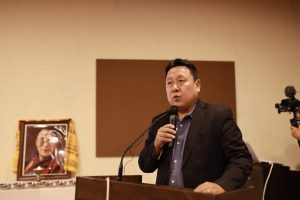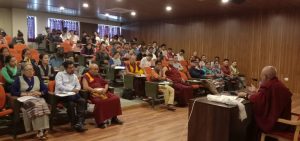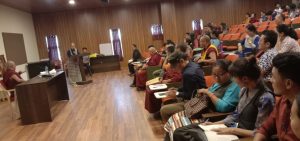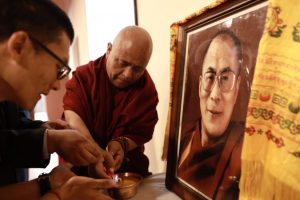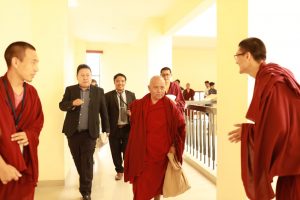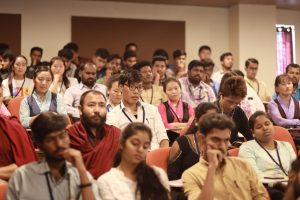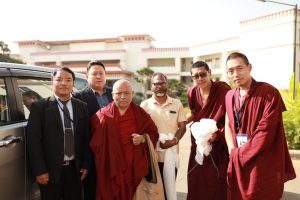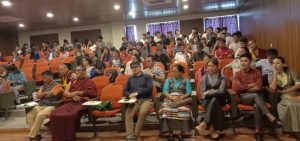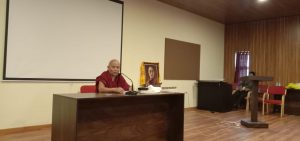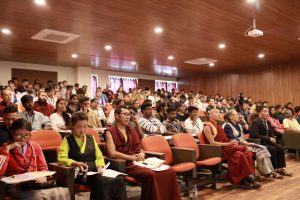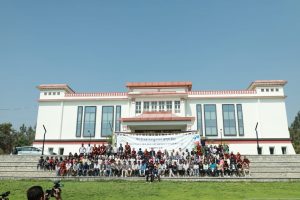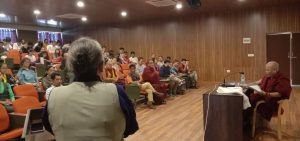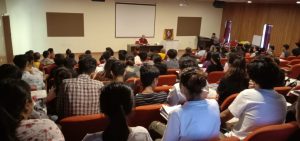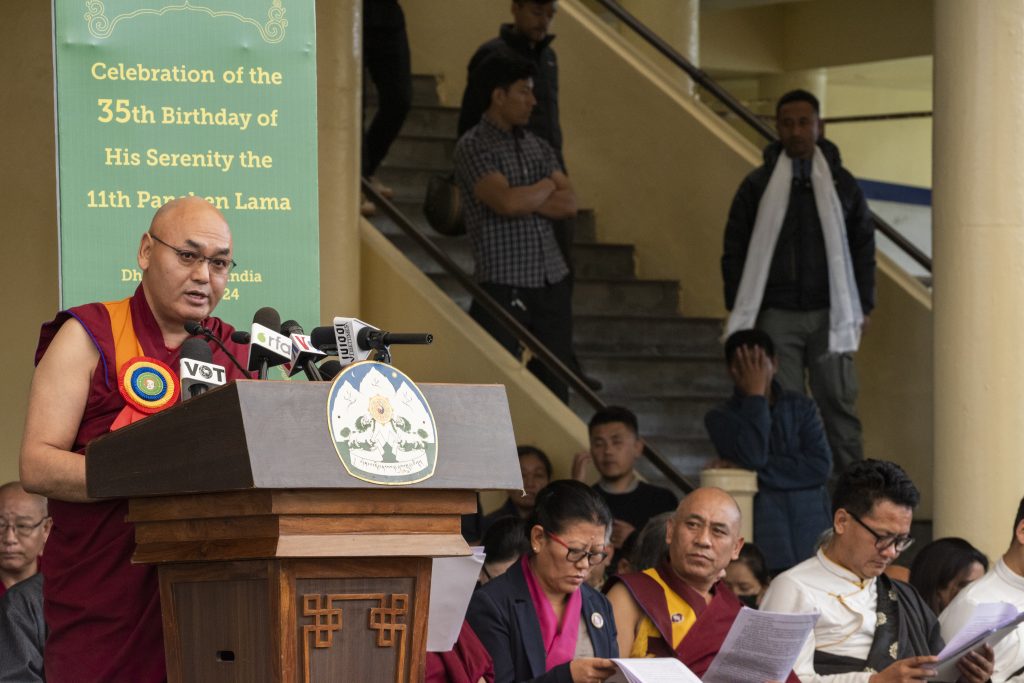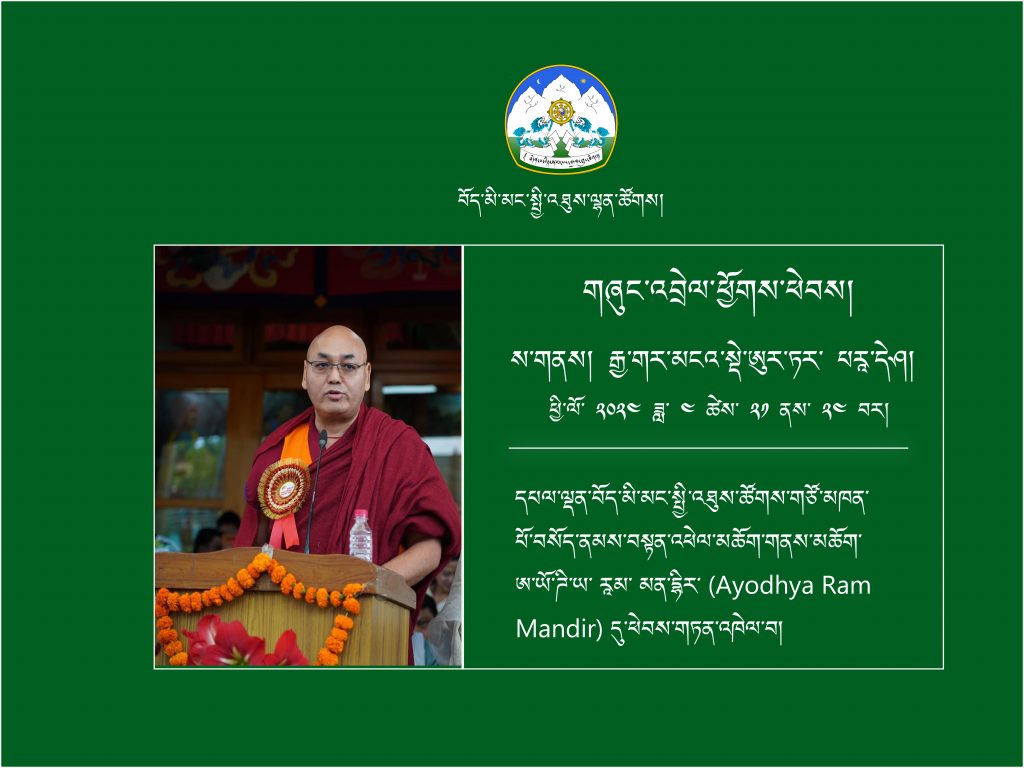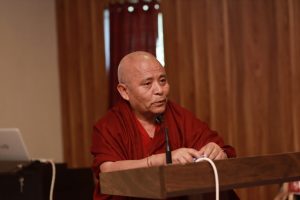
Deputy Speaker Acharya Yeshi Phuntsok Addressing the Preliminary Seminar of Tibetan College Students’ Conference at DLIHE on 15 Feb 2020
Bangalore: Deputy Speaker Acharya Yeshi Phuntsok of Tibetan Parliament-in-Exile attended the preliminary seminar of the 14th Tibetan College Students’ Conference as the Chief-guest and spoke on the ‘Importance of Universal Ethics’ on 15 February at Dalai Lama Institute for Higher Education (DLIHE) in Bangalore.
Deputy Speaker was received by the CTA Chief Representative of South Zone on arrival at Bangalore on the previous day. On 15 February, Deputy Speaker met with the members of the organizing committee of the 14th Tibetan College Students’ Conference at DLHIE.
The preliminary seminar started with a brief introduction of the seminar and the lighting of the butter lamp by the guests, followed by the welcome address by the Chief Representative of South Zone and the Deputy Speaker’s address.
Deputy Speaker started his address by greeting all the guests and attendees of the seminar on behalf of Tibetan Parliament-in-Exile, “The topic of the seminar ‘Importance of Universal Ethics’ is profound but can be explained both in terms of religious and non-religious ways. In terms of non-religious or the universal way, ethics is primarily following constitution, laws, rules, and regulations of the country and that of society.”
“Secondly, ethics in the religious term is embracing good moral values through the three doors i.e. body, speech, and mind. The most essential is good motivation, compassion, and love. We should think not just of humans but of all the sentient beings, considering others before self. Even while studying, students should be motivated to study and work for others.”
“Ethics can be learned from Mahatma Gandhi, Shri J. Krishnamurthy and most importantly from His Holiness the 14th Dalai Lama. The book called ‘Ethics for the new millennium’ by His Holiness the Dalai Lama is a must-read for young students like you all. Working with an altruistic attitude is bound to bring a positive outcome for both oneself and others, and is also a source of good merit.”
“In Buddhism, we consider the nature of matters as impermanent, subject to constant change. It may appear that matters exist as independent in relative truth but they are not in ultimate truth, which can only be inferred through self-realization. The thought of impermanence is extremely important to have a fruitful result in any venture. It is also essential in developing altruism and tolerance and not to get inflicted with attachment.”
“Now speaking of ethics of body (physical morality), which is mainly behaving morally and respectably while maintaining a virtuous and upright character. Since physical appearance is the first thing people see, so it is extremely important to maintain physical morality.”
“Likewise, verbal morality or ethics of speech is also important. The art of speaking softly, truthfully, reasonably, and without hurting others’ sentiment is verbal morality. Similarly, the morality of thought (mind) can be explained as positively motivated thought with a sense of altruism and patience. So, upholding the morality of body, speech, and mind is called good morality or universal ethics.”
“The most important thing is practising education on moral values in our day to day life and in our society. Even though people follow different religions, for example, some are Buddhists while others are Muslims, Hindus, Christians, etc. but the concept of morality is same in all the religions that is to become a good individual which is not a prepossessed thing but rather gained through constant practice.”
After Deputy Speaker concluded his address, he distributed publications of Tibetan Parliament-in-Exile on issues concerning Tibet to the attendees of the seminar.
Thereafter, Deputy Speaker also addressed teachers, staff, and students of the Dalai Lama Institute for Higher Education at the request of its Director. Deputy Speaker spoke on the issue of Tibet, Tibetan democratic polity, the self-immolation of Tibetans inside of Tibet, and on how Tibetans inside Tibet are resisting the repressive policies of China. He further spoke about generations of Tibetans inside Tibet protesting China and their brothers and sisters in exile who have strived in settling in an alien land and meeting the basic necessities in the 1960s to sustaining the Tibetan settlements today in exile through the blessings of His Holiness the Dalai Lama and his farsighted vision.
Deputy Speaker’s advice to them was to be responsible citizens and suggested the necessity for Tibetans to discuss democratic ideologies like liberalism, conservatism, socialism, etc. Similarly, he advised them on taking responsibility as Tibetans just like they would claim facilities that they are provided as Tibetans. Deputy Speaker also advised the students there to read more books of His Holiness the Dalai Lama, J. Krishnamurthy, and others and at the same time strive to become a good and responsible Tibetan.
